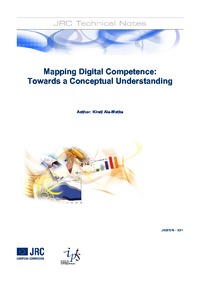Mapping Digital CompetenceTowards a Conceptual Understanding
|

|
 Diese Seite wurde seit 1 Jahr inhaltlich nicht mehr aktualisiert.
Unter Umständen ist sie nicht mehr aktuell.
Diese Seite wurde seit 1 Jahr inhaltlich nicht mehr aktualisiert.
Unter Umständen ist sie nicht mehr aktuell.
 Zusammenfassungen
Zusammenfassungen
 Technologies are increasingly being used in society and the economy, and this is transforming ways of working, studying, communicating, accessing information and spending leisure time, among others. Attention must be paid to ensuring that everyone has digital competence as it provides important benefits while its lack can lead to various risks to children, young people, workers, elderly, groups at risk of exclusion and all citizens in general. It is not always clear however what is meant with digital competence. Therefore, the IS Unit at JRC-IPTS has launched a project to develop guidelines for supporting digital competence development in Europe on the request of DG Education and Culture.
This report reviews needs for digital competence, different concepts used to describe and understand it, and related policy approaches and measurements. Based on these, it suggests a conceptual model with the following main areas:
Technologies are increasingly being used in society and the economy, and this is transforming ways of working, studying, communicating, accessing information and spending leisure time, among others. Attention must be paid to ensuring that everyone has digital competence as it provides important benefits while its lack can lead to various risks to children, young people, workers, elderly, groups at risk of exclusion and all citizens in general. It is not always clear however what is meant with digital competence. Therefore, the IS Unit at JRC-IPTS has launched a project to develop guidelines for supporting digital competence development in Europe on the request of DG Education and Culture.
This report reviews needs for digital competence, different concepts used to describe and understand it, and related policy approaches and measurements. Based on these, it suggests a conceptual model with the following main areas: - Instrumental knowledge and skills for tool and media usage;
- Advanced skills and knowledge for communication and collaboration, information management, learning and problem-solving, and meaningful participation;
- Attitudes to strategic skills usage in intercultural, critical, creative, responsible and autonomous ways.
 Dieses Buch erwähnt ...
Dieses Buch erwähnt ...
 Personen KB IB clear | Katie Clinton , Committee on Information Technology Literacy , Henry Jenkins , Ravi Purushotma , Alice J. Robison , Margaret Weigel | |||||||||||||||||||||||||||
 Fragen KB IB clear | Welche Ausbildung wird in der Informationsgesellschaft benötigt? | |||||||||||||||||||||||||||
 Begriffe KB IB clear | DigComp , Medienkompetenz/media literacymedia literacy | |||||||||||||||||||||||||||
 Bücher |
|
 Dieses Buch erwähnt vermutlich nicht ...
Dieses Buch erwähnt vermutlich nicht ... 
 Nicht erwähnte Begriffe | DigComp 2.0 |
 Zitationsgraph
Zitationsgraph
 Zitationsgraph (Beta-Test mit vis.js)
Zitationsgraph (Beta-Test mit vis.js)
 7 Erwähnungen
7 Erwähnungen 
- Digital Competence in Practice - An Analysis of Frameworks (Anusca Ferrari) (2012)


- DIGCOMP - A Framework for Developing and Understanding Digital Competence in Europe (Anusca Ferrari) (2013)


- Notions of disruption - A collection of exploratory studies written and commissioned by the Swiss Science and Innovation Council SSIC (Schweizerischer Wissenschafts- und Innovationsrat) (2017)


- 3. Digital competences - Paper commissioned by the Swiss Science and Innovation Council SSIC (Sabine Seufert) (2017)

- 3. Digital competences - Paper commissioned by the Swiss Science and Innovation Council SSIC (Sabine Seufert) (2017)
- Second Handbook of Information Technology in Primary and Secondary Education (Joke Voogt, Gerald Knezek, Rhonda Christensen, Kwok-Wing Lai) (2018)


- 7. Dissolving the Digital Divide - Creating Coherence in Young People´s Social Ecologies of Learning and Identity Building (Kristiina Kumpulainen, Anna Mikkola, Antti Rajala)


- 7. Dissolving the Digital Divide - Creating Coherence in Young People´s Social Ecologies of Learning and Identity Building (Kristiina Kumpulainen, Anna Mikkola, Antti Rajala)
- Proceedings of the 13th Workshop in Primary and Secondary Computing Education, WiPSCE 2018, Potsdam, Germany, October 04-06, 2018. (Andreas Mühling, Quintin I. Cutts) (2018)
- What do secondary school students associate with the digital world? (Torsten Brinda, Stephan Napierala, Gero Alexander Behler) (2018)


- What do secondary school students associate with the digital world? (Torsten Brinda, Stephan Napierala, Gero Alexander Behler) (2018)
- Digitale Transformation - Beiträge zur Lehrerinnen- und Lehrerbildung 2/2018 (2018)

- Digitale Transformation in Schulen - Kompetenzanforderungen an Lehrpersonen (Sabine Seufert, Josef Guggemos, Eric Tarantini) (2018)


- Digitale Transformation in Schulen - Kompetenzanforderungen an Lehrpersonen (Sabine Seufert, Josef Guggemos, Eric Tarantini) (2018)
- Digital Leadership - Schulen im digitalen Wandel führen (Tobias Röhl, Johannes Breitschaft, Eliane Burri, Nicole Wespi) (2023)


- Digital kompetente Schulorganisationen - Entwicklung von unterstützenden Organisationsstrukturen (Fanny Pettersson) (2018)

- Digital kompetente Schulorganisationen - Entwicklung von unterstützenden Organisationsstrukturen (Fanny Pettersson) (2018)
 Co-zitierte Bücher
Co-zitierte Bücher

Work, Progress, and Prosperity in a Time of Brilliant Technologies
(Erik Brynjolfsson, Andrew McAfee) (2014)

 Volltext dieses Dokuments
Volltext dieses Dokuments
 |  Mapping Digital Competence: Gesamtes Buch als Volltext ( Mapping Digital Competence: Gesamtes Buch als Volltext ( : :  , 5878 kByte; , 5878 kByte;  : :  Link unterbrochen? Letzte Überprüfung: 2020-11-28 Letzte erfolgreiche Überprüfung: 2020-05-11) Link unterbrochen? Letzte Überprüfung: 2020-11-28 Letzte erfolgreiche Überprüfung: 2020-05-11) |
 Anderswo suchen
Anderswo suchen 
 Beat und dieses Buch
Beat und dieses Buch
Beat hat dieses Buch während seiner Zeit am Institut für Medien und Schule (IMS) ins Biblionetz aufgenommen. Beat besitzt kein physisches, aber ein digitales Exemplar. Eine digitale Version ist auf dem Internet verfügbar (s.o.). Aufgrund der wenigen Einträge im Biblionetz scheint er es nicht wirklich gelesen zu haben. Es gibt bisher auch nur wenige Objekte im Biblionetz, die dieses Werk zitieren.










 Biblionetz-History
Biblionetz-History